Germany is the latest European country to be hit by a wave of farmer protests. In a week of nationwide action that runs through January 12, farmers in the European oil economy are protesting against proposed cuts to subsidies for fuel used in agriculture.
Convoys of thousands of tractors and trucks have caused traffic chaos and isolated several cities in recent days, with production at a Volkswagen facility in the northern city of Emden even halted.
Last week, a ferry carrying German Economy Minister Robert Habeck back from a family holiday on the island of Hallig Hooge off Germany’s northern coast was blocked by hundreds of farmers angry at the government’s plans to cut diesel subsidies.
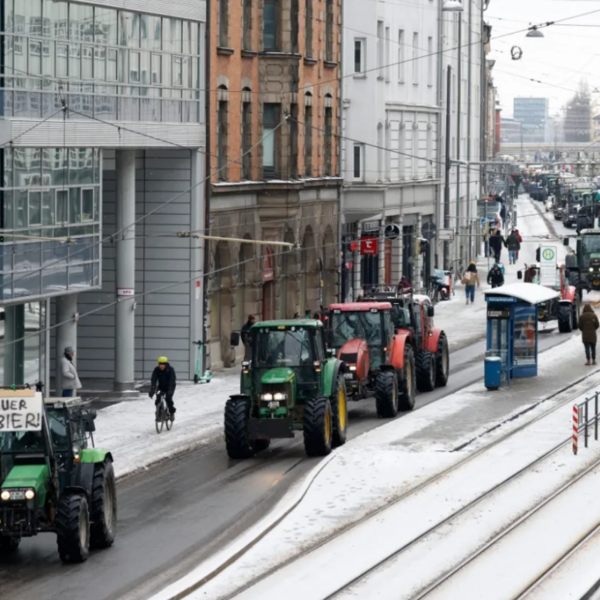
Banners reading “Enough is enough” (left) and “ Agriculture thinks in generations, not in (legislative) periods” are stuck on tractors during a protest against the federal government’s austerity plans, in Halle an der Saale, eastern Germany. Photo: AFP/Al Jazeera
Similar protests have spread across numerous European Union (EU) member states, with some cases turning violent.
Protests in the Netherlands have occasionally sparked major blockades in recent years, aiming to push for planned measures to tackle chronic nitrogen pollution. The Dutch protests even spawned a new political party in 2019, the populist Peasants’ Movement (BBB).
In Belgium, Spain and France, farmers have also taken to the streets to express their discontent over the impact of environmental reforms and high costs. Poland and other Eastern European countries have seen similar protests, but these have largely been linked to the flooding of EU markets with cheap Ukrainian grain.
Important Similarities
Jan Douwe van der Ploeg, an agricultural sociologist and former professor at Wageningen University in the Netherlands, sees a key similarity in many of these cases: Protection of the status quo.
Concerns often relate to “the right to continue to use subsidies that were obtained in the past, or to continue to use fossil fuels or pesticides. All of which are very clear manifestations of industrial agriculture,” Van der Ploeg told DW.
Although they are all protests, protests in different countries are triggered by situations specific to those countries.
German protests have been over diesel subsidies, Spanish farmers recently targeted water-saving measures and French protesters' concerns include irrigation and fuel costs, as well as EU trade policy.
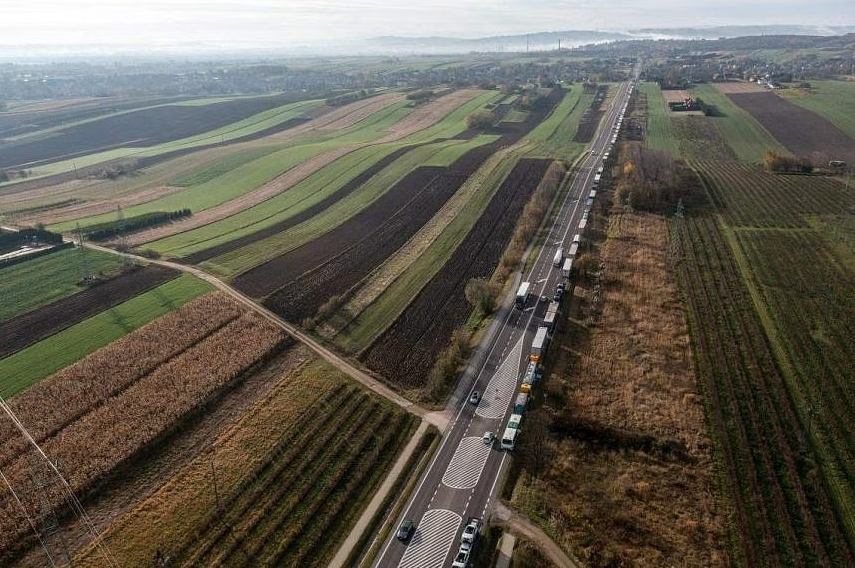
A long line of trucks waits on the road in Przemysl, southeastern Poland, to cross the Polish-Ukraine border at Medyka. Medyka-Shegyni is the only border crossing that has not been blocked by Polish truckers demanding the EU reinstate transport quotas to limit the number of Ukrainian trucks entering Poland. Photo: Straits Times
However, with fertiliser and fuel prices soaring in Europe since Russia launched its military campaign in Ukraine, farmers say they are feeling the squeeze across the continent despite much higher food prices on supermarket shelves.
Agricultural productivity simply cannot keep up with rising costs, says Anne-Kathrin Meister of the German Rural Youth Federation (BDL).
“If you only compare the price increases of machinery, pesticides and fertilizers, productivity has never increased at the same rate,” Meister told DW by phone from Berlin.
The challenges of the past few years have added up to the current ones, Ms Meister said. While the German government’s focus on cutting subsidies for diesel engines and vehicles has been “just the last straw”.
The German agricultural sector is not opposed to environmental reform, but farmers need more support, Ms. Meister stressed. “Farmers are the first to be affected when flora and fauna are degraded,” she said.
The rise of the far right
For the German government, there are also concerns that the protests are being exploited by the far right – something German Interior Minister Nancy Faeser highlighted this week.
Economy Minister Habeck has sounded the alarm about online posts related to the protests, as well as displays of nationalist symbols.
At the January 8 protest, many tractors had banners emblazoned with the logo of the far-right nationalist Alternative for Germany (AfD) party, which is currently second in the polls with 23% support.
On its social media channels, the AfD painted a picture of ordinary people “ruined by an irresponsible political leadership” and called on people to join what the party called a “general strike”, The Guardian reported.

German Vice Chancellor and Economy Minister Robert Habeck was unable to board the ferry on the evening of January 4, 2024, due to a blockade by farmers. Photo: Euronews
Joachim Rukwied, president of the German Farmers’ Association, has tried to distance the protests from extremists. “We don’t want right-wing and other extremist groups who want to overthrow the government at our protests,” Rukwied told Germany’s Bild newspaper on January 7.
The farmers’ unease is being viewed with concern in Brussels. Above all, EU officials are concerned about a setback to ambitious climate targets enshrined in law. The European Commission, the bloc’s executive body, has set an overall target of net-zero emissions by 2050. For agriculture, planned changes include a 50% reduction in chemical pesticides by 2030.
With EU elections scheduled for June, some worry how safe these well-laid plans will be if the European Parliament tilts to the right.
This risk was made clear during the political furore over the Nature Recovery Act, according to Marco Contiero, an activist from the EU branch of the climate campaign group Greenpeace.
The law was narrowly passed by the European Parliament last year after a last-minute “resistance” led by the centre-right European People’s Party. The EPP, the bloc’s largest legislative group, has positioned itself as a defender of farmers’ interests against plans to return farmland to natural habitats.
“Conservative parties as well as more right-wing parties have decided to use or abuse agricultural communities as an electoral tool to achieve better results,” Contiero told DW .
Minh Duc (According to DW, The Guardian)
Source








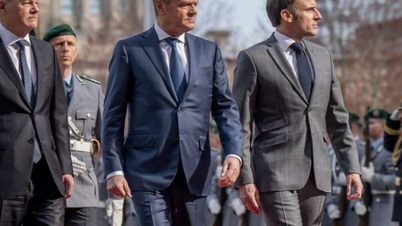
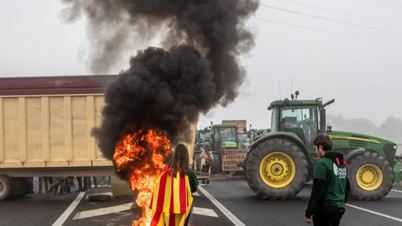
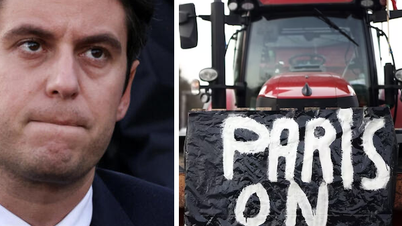
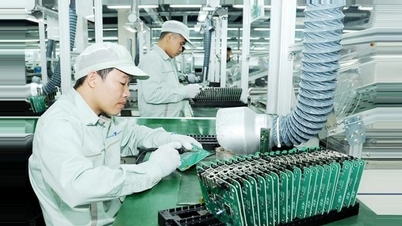






















































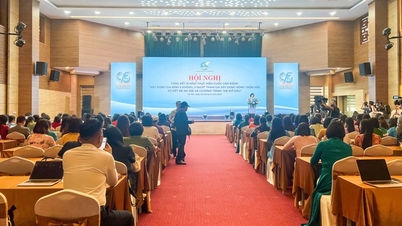
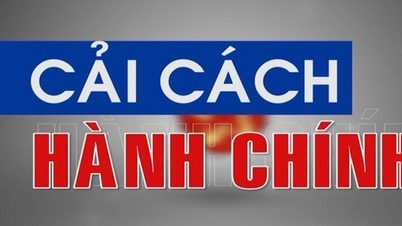





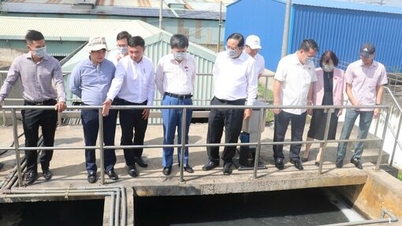



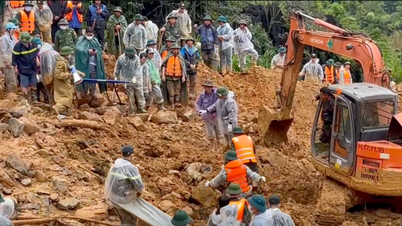



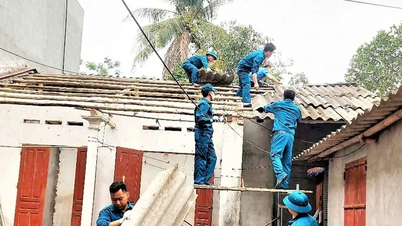














Comment (0)